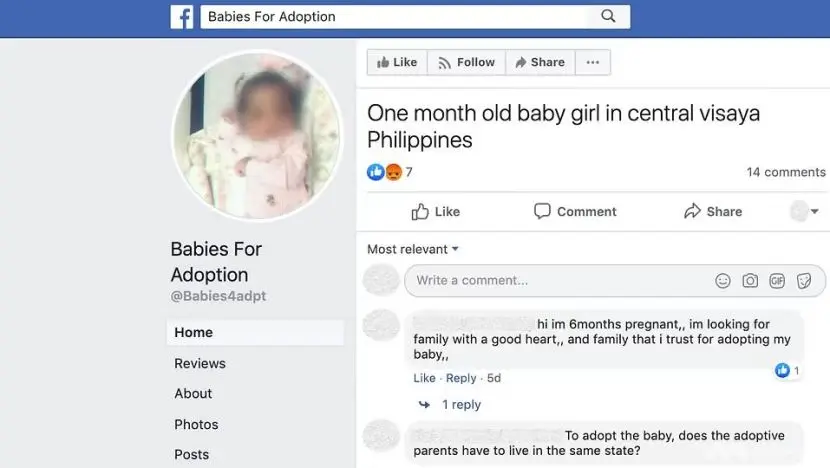

Babies for 400 euros on Facebook? This is what illegal adoptions are like in the Philippines
The Philippine government punishes illegal adoptions with life imprisonment and fines of up to 84,000 euros. Poverty pushes dozens of young pregnant women to give their babies up for adoption in exchange for money in the Philippines, where parents looking for a child can "buy" a baby through Facebook for just a few hundred euros.
The economic crisis in the world often forces people who suffer from this lack of money to carry out acts that violate human rights, as is the case in the Philippines, where young pregnant women give their babies up for adoption in exchange for money. This situation is aggravated when the adoption is done through Facebook pages that offer the infants for a few euros. An example of this was the case of a 39-year-old Filipino beautician who went to a Facebook page with the intention of asking for a doll, but was met with a response from the merchant who told her that it was not a toy but a real baby that she was going to have in about a month and for which she was asking 400 euros.
"It's 20,000 pesos (about 400 euros). But it's not a doll, it's a baby that I'll give birth to in a month, ma'am," said the young woman who was offering her babies on the website.
The person speaking on the other side of the screen was Melissa, a 21-year-old Filipino woman who, due to economic hardship and the lack of support from her family and ex-partner - who left her pregnant - decided a few months ago to give up and give her future child up for adoption in the vast market for babies for sale in the Philippines.
"I can't give my son a good life, I have no money and I lost my job when I got pregnant. It's very sad but I accepted it and now I just want to make sure he'll be in good hands," laments Melissa in statements to EFE during her second meeting with Joyce, who in addition to collecting dolls was also thinking about adopting a second child.
Although the Ministry of Social Affairs acknowledged in 2019 that there were "hundreds of thousands" of people with falsified birth records, there is no data or studies on illegal and opaque sales of babies, often carried out through social networks.
The Philippine government, which punishes illegal adoptions with life imprisonment and fines of up to 84,000 euros, pursues these illegal activities that are considered "human trafficking" and that have proliferated in recent years, especially on Facebook, used by more than 90 percent of Filipinos.
"There are more and more Facebook pages where children are illegally adopted," says consultant Wilhelmina Dacanay, from the Kaisahang association, an NGO dedicated to the protection of vulnerable children in the Philippines and funded by the Philippine Ministry of Social Affairs.
Dacanay warns that illegal adoptions are increasing in the Philippines and explains that the lack of papers with which many of these transactions are carried out leaves children defenseless against possible abandonment, with many of them "on the streets before they turn 18."
Another possible mishap is the "failed sale," when the adoptive mother regrets her "acquisition" and returns the child to the arms of its biological mother.
According to Efe, in this virtual market there are also exchanges of babies to obtain a child of the desired sex: if the purchasing mother decides that she wants a girl instead of a boy, she presents her case on the networks to exchange it.
Transactions with verbal agreement
Three days after their first conversation on Facebook, Melissa and Joyce - who use pseudonyms to hide their true identity from possible legal repercussions - had their first meeting in person and agreed that the biological mother would stay at the adoptive mother's house until she gave birth to her child.
Young Melissa, with large, expressive black eyes and originally from the island of Negros (in the centre of the archipelago), recounts in fluent English her hardships before meeting Joyce, who wants to adopt a baby since her firstborn has already left home and is entering university this year.
"My father died from drug abuse, and my mother is still addicted to gambling and loses what little she earns. When I got pregnant, she didn't want to help me," Melissa says sadly.
"My ex-boyfriend left me as soon as he found out I was pregnant, and I don't want to have an abortion [illegal activity in the Philippines]. I can only give my baby to someone who can afford it and take good care of it," she adds.
Alone and desperate for her lack of income, Melissa easily found one of the many Facebook pages where biological and adoptive mothers get in touch to arrange illegal adoptions.
Before meeting Joyce, she found another mother who was a candidate to adopt her child, travelled to Manila in February to meet her and stayed at her house, but the situation soon turned into a nightmare.
"This woman locked me in a room with hardly any ventilation. She wouldn't let me out so that her neighbours wouldn't see me," as she had assured her lover, who lives abroad, that she was pregnant with his child. "She gave me rice every day and little else," Melissa says.
With her health deteriorating from poor nutrition and the stifling heat of that dark room, she met Joyce on another Facebook page and managed to "escape" from her captivity. Now, Melissa expects to give birth next week, and is taking refuge in Joyce's home, who provides food and pleasant living conditions.
When Melissa gives birth to her baby, a boy, she hopes that Joyce will go to the civil registry with the child and certify that she is the biological mother, after which Melissa can return to her hometown and fulfill the verbal agreement between them not to see the child again.
